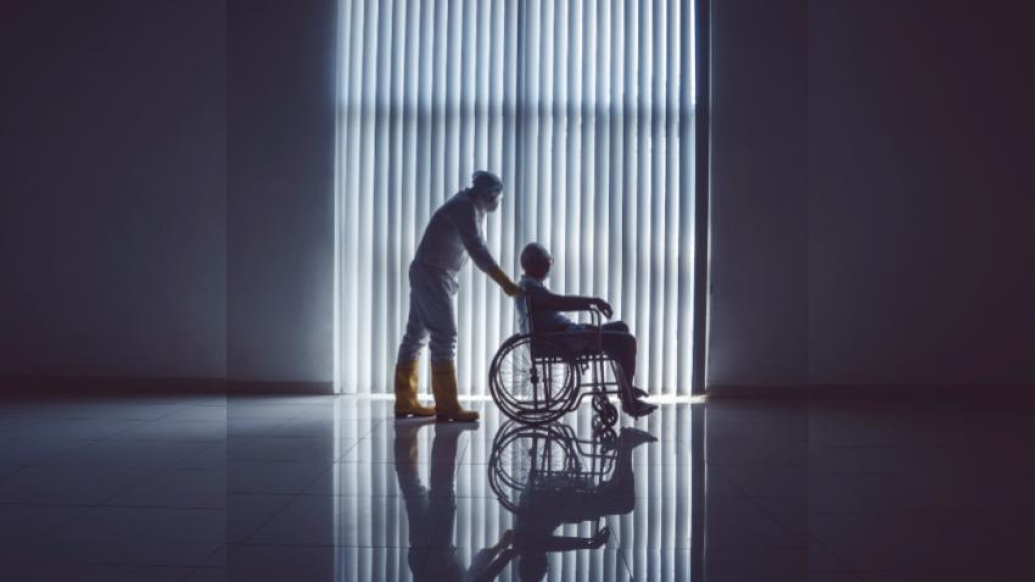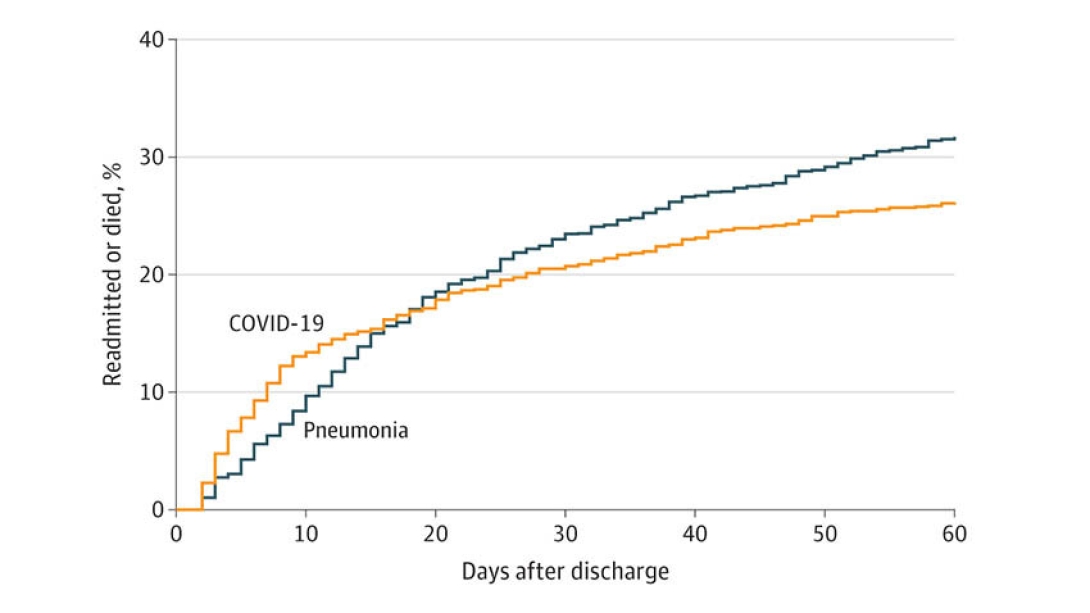Comparison with heart failure and pneumonia patients shows much different pattern of 60-day readmission to hospital or death.
11:36 AM
Author |

In the first months after their COVID-19 hospital stay, patients faced a high risk of ongoing health problems, trips back to the hospital, and death, a growing number of studies has shown.
But the first week and a half may be especially dangerous, according to a new study in JAMA by a team from the University of Michigan and VA Ann Arbor Healthcare System.
COVID-19 patients had a 40% to 60% higher risk of ending up back in the hospital or dying in the first 10 days, compared with similar patients treated at the same hospitals during the same months for heart failure or pneumonia.
By the end of 60 days, the COVID-19 patients' overall risk of readmission or death was lower than that for the other two serious conditions.
Even so, in the first two months, 9% of the COVID-19 patients who survived hospitalization had died, and almost 20% had suffered a setback that sent them back to the hospital.
That's on top of the 18.5% who had died during their hospitalization.

The researchers compared post-hospital outcomes for nearly 2,200 veterans who survived their hospitalization at 132 VA hospitals for COVID-19 this spring and early summer, with outcomes for nearly 1,800 similar patients who survived a stay for pneumonia that wasn't related to COVID-19, and 3,500 who survived a heart failure-related stay, during the same time.
With hundreds of thousands of Americans now hospitalized for severe cases of COVID-19, and hospitals working to free up beds for an ongoing surge, the study suggests a need for special vigilance in the first days after discharge, says John P. Donnelly, Ph.D., M.S.P.H., M.S., the study's first author and an epidemiologist in the Department of Learning Health Sciences at Michigan Medicine, U-M's academic medical center.
SEE ALSO: Patients with ARDS, COVID-19 Face Significant Financial Effects in Recovery
"By comparing COVID-19 patients' long-term outcomes with those of other seriously ill patients, we see a pattern of even greater-than-usual risk right in the first one to two weeks, which can be a risky period for anyone," says Donnelly, who is a scholar in a special training program for critical illness data researchers at the U-M Institute for Healthcare Policy and Innovation. "Now, the question is what to do about it. How can we design better discharge plans for these patients? How can we tailor our communication and post-hospital care to their needs? And how can we help their caregivers prepare and cope?"
More about the study
Donnelly worked on the study with Michigan Medicine and VAAHS critical care physicians Hallie Prescott, M.D., M.Sc., and Theodore Iwashyna, M.D., Ph.D. Prescott is senior author of another recent paper showing slow recovery in COVID-19 patients hospitalized in Michigan hospitals during the state's spring surge.
By comparing COVID-19 patients' long-term outcomes with those of other seriously ill patients, we see a pattern of even greater-than-usual risk right in the first one to two weeks, which can be a risky period for anyone.John P. Donnelly, Ph.D., M.S.P.H.
"Unfortunately," says Iwashyna, "this is yet more evidence that COVID-19 is not 'one and done.' For many patients, COVID-19 seems to set off cascades of problems that are every bit as serious as those we see in other diseases. But too little of our healthcare response — and too little research — is designed to help these patients as they continue for days, weeks, even months to recover from COVID-19."
Like Podcasts? Add the Michigan Medicine News Break on iTunes or anywhere you listen to podcasts.
Iwashyna further notes, "It is likely that there are very similar patterns happening in the private sector, but the VA had the data to be able to look early."
The study didn't include non-veterans treated at VA hospitals in early-surge states, through the "Fourth Mission" program that offset bed shortages at non-VA hospitals. It also doesn't include any readmissions to non-VA hospitals.
All but 5% of the patients were male, and half were Black, which is not nationally representative but focuses on two high risk groups. But within the veterans studied, the only factor that made a significant difference in outcomes was age; about half of veterans in their 70s and 80s died in the 60 days after leaving the hospital.
SEE ALSO: Life After COVID-19 Hospitalization: Major Lasting Effects on Health, Work and More
In all, the 2,179 COVID-19 patients spent a total of 27,496 days in the hospital, and the 354 veterans who were readmitted spent a total of 3,728 additional days in the hospital.
The most common reasons listed for rehospitalization were COVID-19, cited in 30% of patients, and sepsis seen in 8.5%. More than 22% of the readmitted veterans went to an intensive care unit.
The study included patients with all three conditions whose hospital stays began in the period from March 1 to June 1, and left the hospital before July 1.
MORE FROM THE LAB: Subscribe to our weekly newsletter
Because these were the early months of the pandemic, Donnelly acknowledges that the experience gained by hospitals during that time, and shared with hospitals in other states with later surges, may have changed post-hospital outcomes.
But the current surge, which is causing hospitals to pull non-specialists into COVID-19 care, and care for other seriously ill patients, may affect outcomes in a negative way.
He and his colleagues hope to continue to study new data from VA and non-VA hospitals as it becomes available and to compare COVID-19 post-hospital outcomes with those for other serious conditions. Comparisons with patients hospitalized for influenza and other viral illnesses would be important to study, given the widespread false claims that COVID-19 is just a minor illness.
Paper cited: "Readmission and Death After Initial Hospital Discharge Among Patients With COVID-19 in a Large Multihospital System," JAMA Network. DOI: 10.1001/jama.2020.21465

Explore a variety of healthcare news & stories by visiting the Health Lab home page for more articles.

Department of Communication at Michigan Medicine
Want top health & research news weekly? Sign up for Health Lab’s newsletters today!





